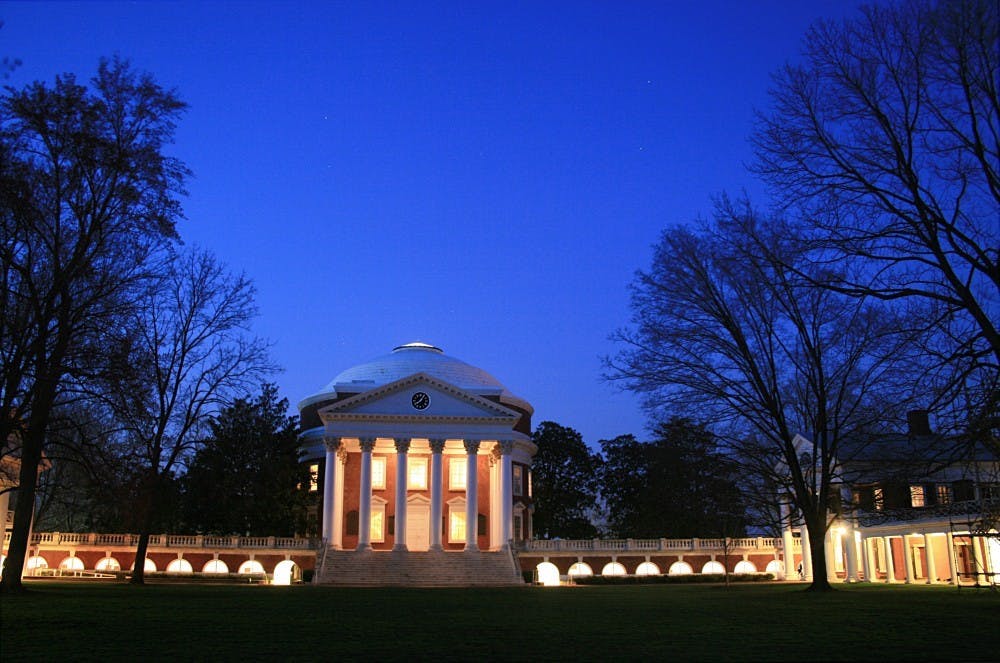With the University’s Annual Fire Safety Security Report and the recent increase in community alerts, it’s time the University and Charlottesville community took action besides expanding its already generous police force. There are many alternative strategies to decrease crime in and around Grounds. Changing the lighting structures around Grounds are one such example that could lead to a significant increase in student safety.
Thus far, the University has focused on changes to police forces. However, many students and residents feel that the expansion of the Charlottesville Police Department, the University Police Department and the Ambassadors will not deter crime nor make students feel safe — a letter has already been sent to the University by Young Democratic Socialists of America at U.Va. revealing multiple concerns students have with UPD. Ultimately, the University felt that creating the Community Oriented Policing Squad was the best solution to these problems. While not policing Grounds 24/7, they will generally be active during the busiest parts of the week — Thursday through Saturday between the hours of 7:00 p.m. and 3:00 a.m. Since we have not seen how broadening police presence will help — at least not until we get better data — it is worth focusing on alternative solutions.
Changing the environment in which we live instead of strictly increasing police presence is a necessary solution. This can be done in a myriad of ways — reallocating resources away from police departments to community centers, mental health centers and schools. Simultaneously, we should encourage a community based on compassion and cooperation rather than individualization and competition. However, one solution that is rarely discussed in addition to the above proposals is redirecting light. Specifically, the lights on Grounds — which serve the purpose of illuminating dark areas — are designed and directed inefficiently.
Poorly designed light sources allow excess light to escape from its source and cause four types of light pollution — glare, skyglow, light trespass, and clutter. Light pollution is caused primarily by bad lighting design, which allows artificial light to shine outward and upward into the sky, instead of focusing on the intended area. Sources of light pollution range from street lamps, exterior lights on homes and businesses, to illuminated signboards and neon signs. Grounds is surrounded by lamps and lights that illuminate walkways, stairs, statues, and more for students and locals. However, this plague of lighting rarely has any kind of shield and escapes into our atmosphere instead of being directed downwards.
Light makes people feel safe, and therefore people tend to travel in well-lit areas. However, poor lighting designs can cause glare, which may allow offenders to use inadequate lighting to their advantage. Criminals can hide in our blind-spots from glare while also spotting targets through poorly lit areas. Furthermore, glare from bright, unshielded lights actually decreases safety since it shines into our eyes and constricts our pupils. Glare also makes it more difficult for our eyes to adjust to low-light conditions.
The University has taken a few steps to mitigate light pollution and glare. In some newly developed areas, outdoor light fixtures are half-shielded and others are pointed directly at the ground. Nonetheless, there is more the University and Charlottesville can do. For instance, use fully-shielded, light efficient fixtures. This would greatly reduce glare and direct light back onto its path. Additionally, modified LED lights that emit warmer yellowish light are preferred to bright white light that blinds eyes and makes adjusting to nighttime difficult. Installing motion detector lights and timers may also alarm offenders and alert residents or bystanders while decreasing light pollution.
Instead of focusing all our attention on police departments, we can focus on our living habitat as well. Where we live affects our behavior and lifestyle. Our environment is more than just light — it’s transportation, housing, renewable energy and sustainability. We are already seeing students demand change regarding fossil fuels. Furthering that improvement to light pollution would be a giant step. It is our duty to make our spaces optimal and safe, regarding both sustainability and crime.
Luke Somers is a third year in the College of Arts and Sciences. He can be reached at opinion@cavalierdaily.com.







